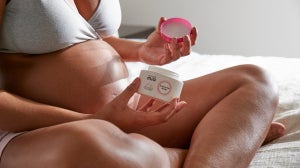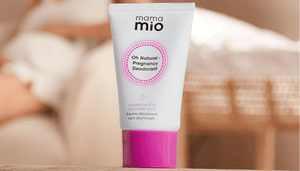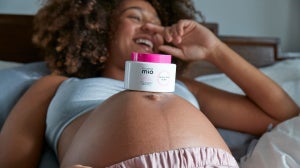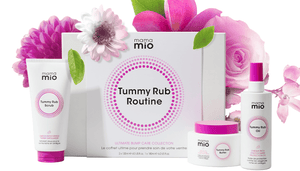What Are Pregnancy Stretch Marks?
Pregnancy stretch marks appear when your skin is not elastic enough to absorb the stretch of your growing tummy during pregnancy. The elasticity of the skin is maintained by essential fatty acids Omegas 3, 6 and 9 which produce the skin's natural barrier. During pregnancy, a mama's omegas are needed elsewhere to support her baby's development, including the baby's brain and eyes. Therefore, leaving the skin's stock of omegas running low.
Pregnancy stretch marks develop in the middle layer of the skin, the dermis. This layer is filled with collagen and elastin fibres which help the skin to move and stretch. Due to the lack of elasticity and depleted omega stores, the collagen matrix can sometimes tear vertically, resulting in a stretch mark.
Why do pregnancy stretch marks appear purple or red?
The red or purple appearance of pregnancy stretch marks is due to the tear in the dermis. The stretch mark makes the blood vessels below visible through the top layer of skin.
Will pregnancy stretch marks hurt or itch?
Dry, stretching skin tends to be itchy or uncomfortable as your skin is having to accommodate for your growing bump. The extra tension which your skin is placed under during pregnancy can feel itchy or uncomfortable. This itch is not a direct result of pregnancy stretch marks, they just occur at the same time and are indicators that your skin is changing.
Does itchy skin during pregnancy mean pregnancy stretch marks?
An itchy belly is the first sign that your skin is adapting to the ever-growing baby who has set up camp in your tummy. Itchy skin does not necessarily mean you will develop stretch marks but it's a good indicator that you should consider beginning your stretch mark prevention routine.
Using your Tummy Rub Scrub 3-4 times a week will gently polish and smooth the skin on your bump. Apply your Tummy Rub Butter or Tummy Rub Oil twice a day over your boobs, bump and thighs to relieve your skin and mega-moisturise your skin.
How to avoid itchy or uncomfortable skin
- Moisturisation is key when trying to relieve itchy, dry skin. Tummy Rub Butter and Tummy Rub Oil are your best friends when it comes to stretch mark relief and prevention. Jam-packed full of Omegas, Tummy Rub Butter and Tummy Rub Oil will help to ease your stretching skin as your bump develops.
- Keep your moisturiser in the fridge. So when you apply your Tummy Rub Butter or Tummy Rub Oil, your itchy, hot skin is instantly cooled and relieved.
- Avoid hot baths or showers, instead turn the temperature down a few notches so not to aggravate your skin. For added relief and moisture, add a few pumps of Tummy Rub Oil to your bath water, sit back and relax.
- Avoid drying products, this could include drying soaps, skin products which contain alcohol or heavily chlorinated water. These all contribute to dry skin which could be aggravating the tight, itchy skin around your bump. Try making the switch to natural, alcohol-free products. We ensure that all of our skincare is safe for both mama and baby.
- Drink plenty of water. It is important to make sure that you are hydrating your skin from the inside out.
As with anything, if your skin is uncomfortable or you are concerned, please speak to your healthcare professional.
Discover how your boobs could change during and after pregnancy, here!







